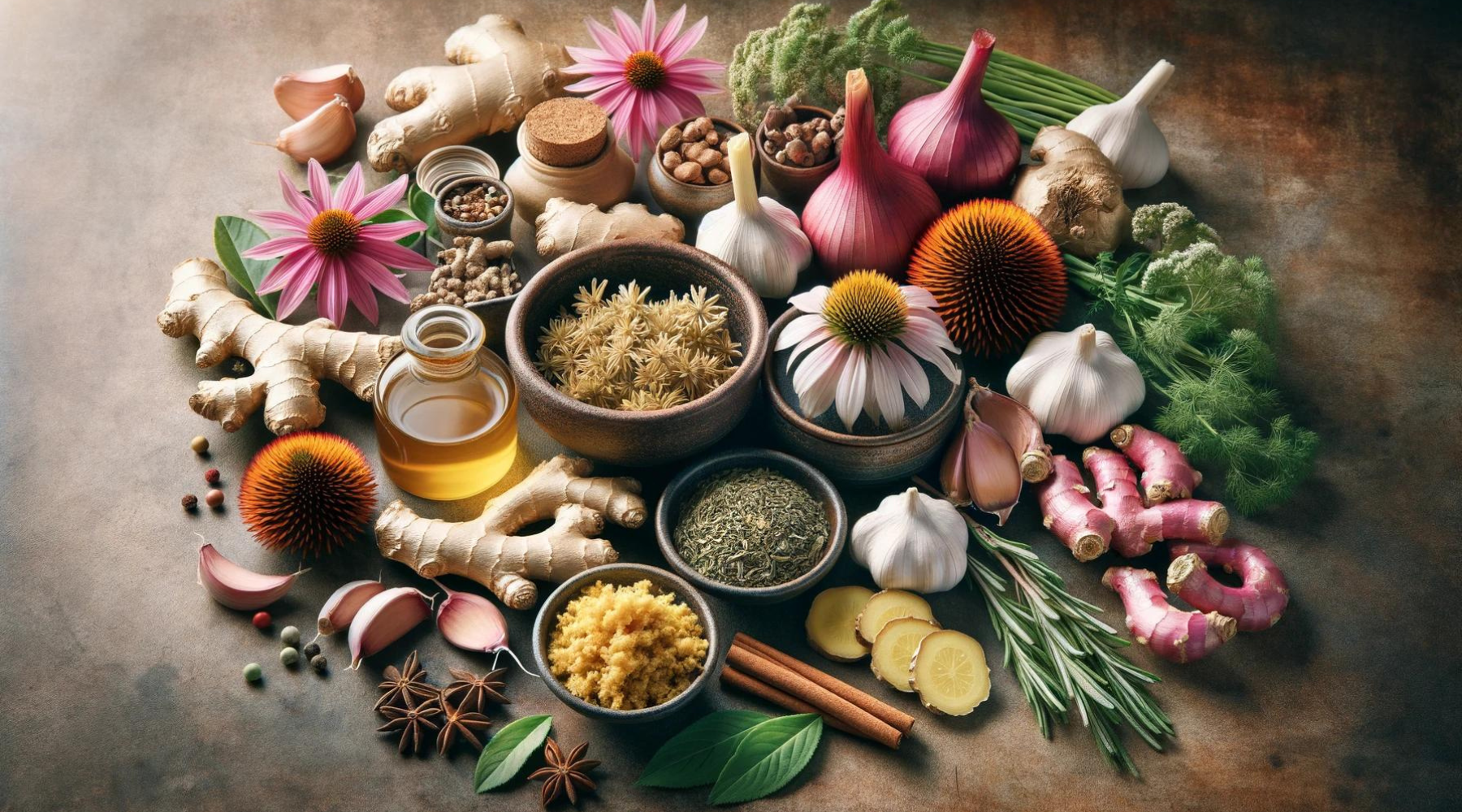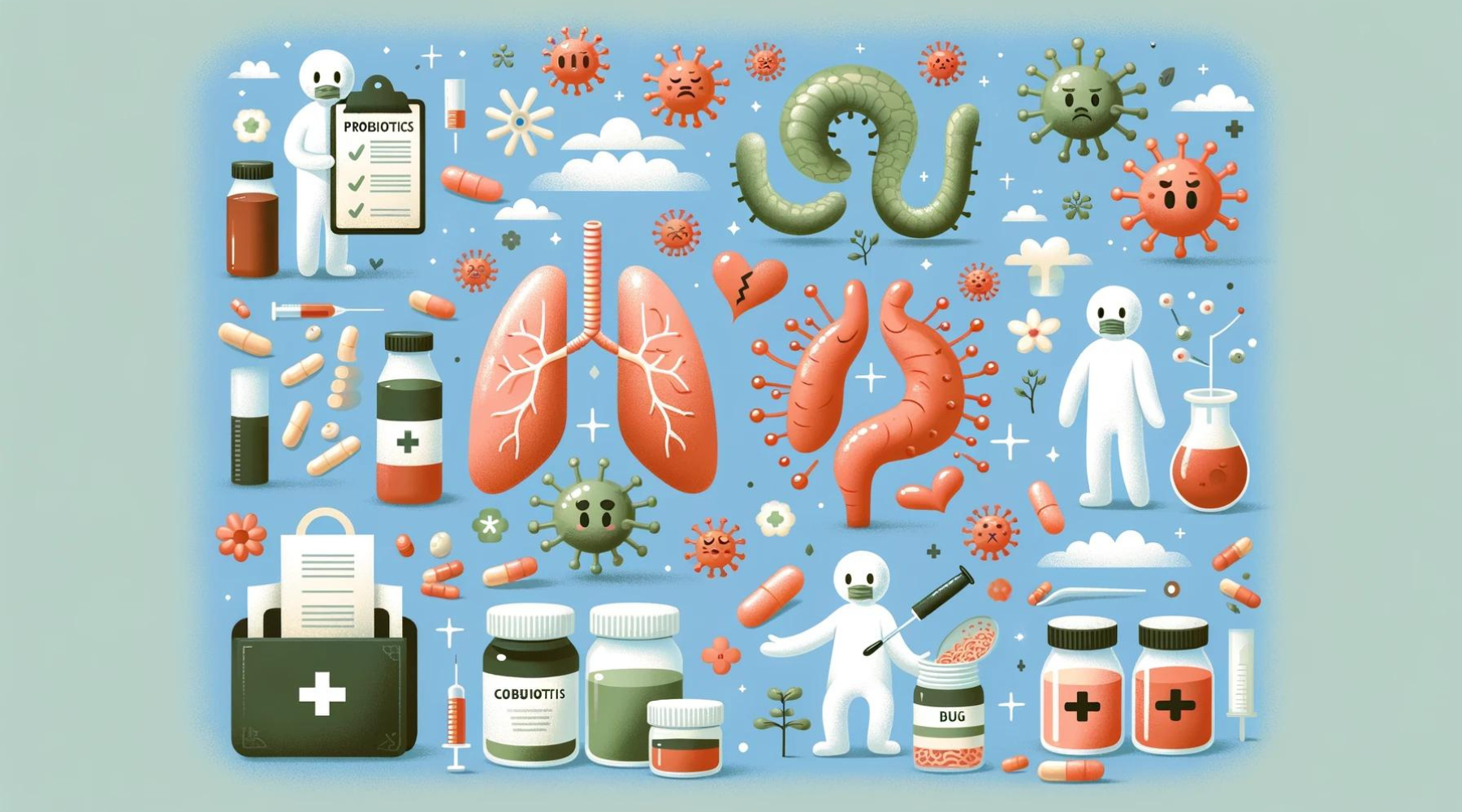Table of Contents
- Navigating Flu Season: Essentials You Need to Know
- The Importance of the Flu Vaccine
- Strengthening Your Immune System
- Herbal Supplements: Nature's Allies in Flu Prevention
- The Role of Probiotics in Flu Prevention
- Hygiene Practices to Prevent Flu
- Conclusion and Disclaimer
- References
- Shop Now for Your Flu Prevention Essentials
Introduction
As the vibrant hues of autumn unfold, painting the landscape in a tapestry of reds, oranges, and yellows, there's an unwelcome companion lurking in the crisp air – the flu virus. The transition from summer's warmth to autumn's chill often heralds the onset of flu season, a period marked by increased susceptibility to the influenza virus. "Sneezes & Leaves: Winning the Flu Battle with Early Prevention" aims to arm you with the knowledge and strategies needed to navigate this season not just as a bystander but as a victor in the battle against flu.
In this guide, we'll explore why autumn is a critical time for flu prevention, delve into the science of why the flu virus thrives in cooler temperatures, and provide actionable advice on how to fortify your immune system. From understanding the importance of the flu vaccine to embracing lifestyle habits that bolster your defences, we're here to ensure you enjoy all the beauty and bounty of autumn without the worry of flu bringing you down. Join us on this journey to health and wellness as we unveil the secrets to preventing flu effectively, ensuring you and your loved ones can savour the season to its fullest.
Navigating Flu Season: Essentials You Need to Know
As the leaves turn and the air chills, flu season sneaks in, exploiting the cooler weather and indoor gatherings to spread. Understanding the flu—a highly contagious respiratory illness caused by the influenza virus—is key to navigating these months safely.
Why does flu season peak in autumn? The virus thrives in lower humidity and cooler temperatures, conditions that autumn delivers. Plus, as we move indoors, the flu finds it easier to hop from one host to another.
Flu strains mutate annually, making last year's immunity less effective. This is why health experts stress the importance of getting a flu shot each year—it's formulated to combat the most current strains.
The stakes are higher than just avoiding discomfort; the flu can escalate into severe complications, particularly for the young, elderly, and immunocompromised. Recognizing symptoms early—fever, cough, body aches—can prevent these outcomes.
Equipping yourself with knowledge about the flu's workings and its seasonal prowess is a powerful form of prevention. With this understanding, we're better prepared to take proactive steps to safeguard our health as the seasons change.

The Importance of the Flu Vaccine
Amid the beauty of falling leaves and the anticipation of holiday gatherings, autumn brings with it the onset of flu season. One of the most effective defences against this annual health challenge is the flu vaccine, a critical tool in our health arsenal designed to protect us from the influenza virus's latest strains.
Why Vaccination Matters: Each year, scientists develop the flu vaccine to target the specific strains predicted to be most prevalent. Because the flu virus is a master of mutation, last season's vaccine won't shield you from this year's strains. Getting vaccinated each autumn is essential to keep your immunity updated and robust.
Broad Protection: The flu vaccine does more than just guard against illness; it significantly reduces the risk of severe flu complications, which can be life-threatening, especially in older adults, young children, and individuals with certain chronic health conditions. By getting vaccinated, you're not only protecting yourself but also contributing to community health by reducing the spread of the virus.
Timing is Key: For optimal protection, it's recommended to get the flu vaccine early in the fall, before the flu season peaks. It takes about two weeks after vaccination for antibodies to develop in the body and provide protection against influenza virus infection.
A Misunderstood Benefit: Some may hesitate, believing that the vaccine can cause the flu, but this is a myth. Flu vaccines are made with either inactivated virus, meaning the viruses are no longer infectious, or with a single gene from a flu virus (as opposed to the whole virus) to produce an immune response without causing the disease.
Making the Right Choice: Deciding to get the flu vaccine is a choice for your health and the well-being of those around you. It's a simple, effective way to reduce your flu risk and ensure that the autumn and winter months are remembered for the joy and warmth they bring, not the illness.
Understanding the critical role of the flu vaccine can empower us to make informed health decisions as we enter flu season. It's a key step in a comprehensive approach to flu prevention, enabling us to enjoy the colder months with one less worry.

Strengthening Your Immune System
As we navigate the transition into cooler months, bolstering our immune system becomes crucial, not just for battling the flu, but for overall health and resilience. A strong immune system is your best defence against the myriad of germs you encounter daily, especially during flu season. Here are fundamental ways to enhance your immune function and keep your body's defences robust.
Nutritious Diet: The cornerstone of a strong immune system is a healthy diet rich in fruits, vegetables, lean proteins, and whole grains. These foods are laden with vitamins and minerals like Vitamin C, Vitamin D, zinc, and selenium, which play vital roles in immune health. Incorporating a variety of nutrient-dense foods ensures your body gets the full spectrum of micronutrients it needs to function optimally.
Regular Exercise: Moderate, consistent physical activity is proven to boost immunity. Exercise helps circulate blood and immune cells more efficiently throughout your body, enabling your immune system to perform its surveillance function against pathogens more effectively. Aim for at least 150 minutes of moderate exercise per week, such as brisk walking, cycling, or swimming.
Adequate Sleep: Sleep and immunity are closely tied. Lack of sleep can weaken your immune system, making you more susceptible to infections. Adults should aim for 7-9 hours of good quality sleep per night. Establishing a regular sleep schedule and reducing screen time before bed can help improve sleep quality.
Stress Management: Chronic stress can suppress your immune response, leaving you more vulnerable to illness. Techniques such as meditation, deep breathing exercises, and yoga can reduce stress levels and bolster your immune function.
Hydration: Staying hydrated is crucial for overall health. Water helps produce lymph, which carries white blood cells and other immune system cells. Aim for 8-10 glasses of water a day, and remember that fruits and vegetables also contribute to your daily water intake.
Supplementation: In some cases, supplements can help fill nutritional gaps in your diet, especially for nutrients crucial for immune function like Vitamin D and zinc. However, it's essential to consult with a healthcare provider before starting any new supplement to ensure it's appropriate for your health needs.
By adopting these lifestyle habits, you can build a strong immune foundation, reducing your risk of contracting the flu and other respiratory infections. Remember, a holistic approach to health not only prepares you for flu season but also supports your well-being year-round.

Herbal Supplements: Nature's Allies in Flu Prevention
In the quest for flu prevention, nature offers a bounty of herbal supplements that can complement traditional health measures. These natural allies are not just about old wives' tales; many are backed by scientific research suggesting their potential to support immune function and reduce susceptibility to infections. Here’s a look at some of the most notable herbal supplements that can be part of your flu-fighting arsenal.
Echinacea: Known for its immune-boosting properties, Echinacea is one of the most popular herbs for fighting the flu and colds. It’s believed to enhance the body's natural defence system and potentially shorten the duration of colds and flu if taken at the first sign of symptoms.
Elderberry: Rich in antioxidants and vitamins, elderberry is another powerful tool against the flu. Studies suggest that elderberry supplements can reduce the severity and length of flu symptoms. Elderberry syrup is a popular choice for its ease of use and palatability.
Ginger: Beyond its well-known gastrointestinal benefits, ginger has anti-inflammatory and antioxidative properties, making it beneficial in managing flu symptoms, especially nausea and inflammation.
Garlic: This common kitchen ingredient is packed with immune-boosting compounds like allicin, which have antimicrobial and antiviral properties. Regular consumption of garlic can help fend off infection.
Astragalus: Used in traditional Chinese medicine, astragalus root has been shown to have immune-boosting and antiviral effects, potentially helping to prevent colds and flu.
Andrographis: Often referred to as “Indian echinacea,” Andrographis is known for its immune-enhancing and anti-inflammatory properties. It’s commonly used to reduce the severity of flu symptoms.
While these herbal supplements can offer support during flu season, it’s important to use them wisely. Not all supplements are suitable for everyone, and some can interact with medications or have side effects. It's crucial to consult with a healthcare provider before incorporating any new supplements into your regimen, especially if you have underlying health conditions or are pregnant or breastfeeding.
Herbal supplements can be a valuable part of your flu prevention strategy, offering a natural way to support your immune system. By combining these with other preventive measures, such as getting the flu vaccine and practicing good hygiene, you can create a comprehensive defence plan against the flu.

The Role of Probiotics in Flu Prevention
As we delve deeper into the arsenal against flu, probiotics emerge as a surprisingly effective ally. These beneficial bacteria, primarily known for their role in digestive health, also play a crucial part in strengthening the immune system and potentially reducing the incidence and severity of respiratory infections like the flu.
Gut Health Equals Immune Health: A significant portion of the immune system is located in the gut, making gut health synonymous with overall immune resilience. Probiotics help maintain a healthy balance of gut flora, which in turn supports the immune system's ability to fend off pathogens.
Probiotics and Respiratory Health: Research has shown that probiotics can have a positive effect on respiratory health. Regular intake of probiotics has been linked to a decrease in the frequency and duration of respiratory infections. This is partly because probiotics can improve the body's production of natural antibodies and boost the activity of T-lymphocytes, cells critical for immune response.
Choosing the Right Probiotics: Not all probiotics are created equal, especially when it comes to flu prevention. Strains such as Lactobacillus and Bifidobacterium have been studied for their immune-boosting effects. These can be found in supplement form or naturally in fermented foods like yogurt, kefir, sauerkraut, and kombucha.
Incorporating Probiotics into Your Diet: To reap the benefits, consider incorporating probiotic-rich foods into your daily diet or taking a probiotic supplement, especially during flu season. However, the choice of probiotic should be tailored to individual health needs and conditions, making consultation with a healthcare provider a wise step.
A Holistic Approach: While probiotics can play a significant role in flu prevention, they should be part of a broader strategy that includes good nutrition, regular exercise, adequate sleep, and, of course, the flu vaccine.
Safety and Considerations: While generally safe for most people, probiotics can pose risks for individuals with certain health conditions or weakened immune systems. It's essential to choose high-quality probiotic supplements and discuss their use with a healthcare professional, especially for those with underlying health issues or those taking other medications.
By fostering a healthy gut microbiome with probiotics, you can bolster your body's defences against the flu. This, combined with other preventive measures, can significantly reduce your risk of falling ill during flu season, allowing you to enjoy the colder months with greater health and peace of mind.

Hygiene Practices to Prevent Flu
Understand the importance of hygiene in flu prevention and effective practices.
In the fight against the flu, hygiene practices play a pivotal role. Simple, everyday actions can significantly reduce the spread of the virus, protecting not only yourself but those around you. Here's a rundown of essential hygiene practices that are particularly effective during flu season.
Frequent Handwashing: Hands are a common vehicle for transferring viruses from surfaces to your nose, mouth, or eyes. Regular handwashing with soap and water for at least 20 seconds is one of the most effective ways to kill viruses and prevent infection. If soap and water are not available, an alcohol-based hand sanitizer can be a good alternative.
Cover Your Coughs and Sneezes: Use a tissue or your elbow to cover your mouth and nose when you cough or sneeze. This practice helps contain respiratory droplets that could carry the virus. Dispose of used tissues immediately and wash your hands afterward.
Avoid Touching Your Face: The flu virus can infect you when transferred from a contaminated surface to your face. Minimize the risk by keeping your hands away from your eyes, nose, and mouth.
Clean and Disinfect Surfaces: Regularly clean surfaces that are frequently touched, such as doorknobs, light switches, and smartphones, with a disinfectant. This can help eliminate the flu virus and other germs.
Stay Home If Sick: If you're experiencing flu symptoms, it's crucial to stay home and rest until at least 24 hours after your fever has subsided without the use of fever-reducing medications. This will help prevent the spread of the virus to others.
Use Disposable Items: If a family member is sick, consider using disposable cups, plates, and utensils to prevent the spread of the virus. Also, avoid sharing towels, bedding, and other personal items until the person has fully recovered.
Ventilate Your Living Spaces: Fresh air can help dilute and disperse respiratory droplets that may contain the virus. Whenever possible, open windows and doors to increase ventilation in your home.
Practice Healthy Habits: Beyond specific hygiene practices, maintaining a healthy lifestyle can also help prevent the flu. This includes staying hydrated, eating nutritiously, exercising regularly, and getting enough sleep.
By integrating these hygiene practices into your daily routine, especially during flu season, you can create a safer environment for yourself and others. Prevention is a shared responsibility, and collectively, we can make a significant impact on reducing the spread of the flu.
Conclusion and Disclaimer
Conclusion:
As we navigate through the autumn and winter months, the flu season demands our attention and diligence. Armed with the knowledge of how the flu virus operates, the protective power of vaccinations, the strength found in our immune system, the aid of herbal and probiotic supplements, and the shield offered by essential hygiene practices, we're equipped more than ever to face the flu head-on. By adopting a proactive approach to health, we can significantly reduce the impact of the flu, safeguarding our well-being and that of our communities.
Remember, the strategies discussed are part of a comprehensive approach to flu prevention. Vaccinations, nutritional supplements, and lifestyle adjustments work together to create a robust defence system. Each action, no matter how small, contributes to a larger shield against the flu, ensuring we can enjoy the colder months with peace and health.
Disclaimer:
This article is intended for educational purposes only and should not be taken as medical advice. While the strategies and recommendations provided are based on scientific research and health guidelines, individual health needs can vary. Always consult with a healthcare professional before making significant changes to your health regimen, including the introduction of new supplements or adjustments to your diet and exercise routine. The flu can be a serious illness, and medical guidance is crucial in ensuring the safety and effectiveness of your health decisions.
Let's welcome the changing seasons not with apprehension but with preparedness and positivity. By embracing the wealth of knowledge and resources available to us, we can look forward to a healthier flu season, filled with the joys of autumn and winter, rather than the challenges.
References



















